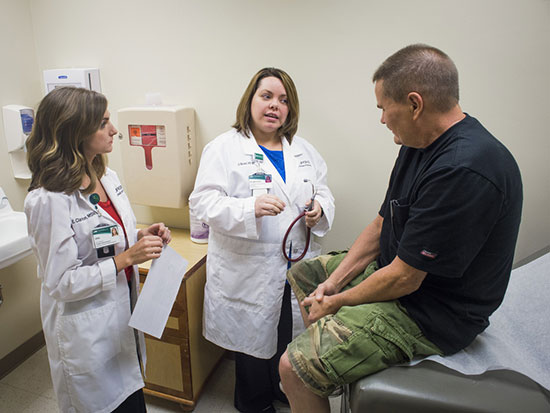Media contact: Adam Pope, arpope@uab.edu
 The HRSA Heart Failure Clinic was funded by a three-year, $1.5 million Nursing Education, Practice, Quality and Retention grant from the Health Resources and Services Administration.
The HRSA Heart Failure Clinic was funded by a three-year, $1.5 million Nursing Education, Practice, Quality and Retention grant from the Health Resources and Services Administration.
The University of Alabama at Birmingham School of Nursing and UAB Hospital, through the UAB Nursing Partnership, have earned a Gage Award for Population Health honorable mention from America’s Essential Hospitals for the partnership’s nurse-led HRSA Heart Failure Clinic.
The award was presented at a luncheon June 22, during VITAL2017, the association’s annual conference. America’s Essential Hospitals is a consortium of 275 U.S. hospitals and health systems dedicated to high-quality care.
“Receiving this recognition on behalf of our team is an honor,” said clinic co-founder Maria Shirey, Ph.D., chair of the Department of Acute, Chronic and Continuing Care. “We consider it a privilege to provide patient- and family-centered care to our most vulnerable population of heart failure patients.”
In December 2014, Shirey collaborated with Connie White-Williams, Ph.D., director of the Center for Nursing Excellence at UAB Hospital, to open the nurse-managed, interprofessional transitional care clinic for heart failure patients recently discharged from UAB Hospital. Its goal was to reduce 30-day hospital readmissions for uninsured heart failure patients and improve access to care for this underinsured and medically underserved population.
It was funded by a three-year, $1.5 million Nursing Education, Practice, Quality and Retention grant from the Health Resources and Services Administration, and provides a medical home for those who have no primary care provider but require follow-up care.
“We want to provide the best possible care for our patients,” White-Williams said. “By doing the simple things such as medication reconciliation, using teach-back methodology and overcoming social barriers, our team of nurses, social workers, patient care technicians and physicians make a difference in the lives of these patients. We provide the resources for patients to manage their heart failure.”
Patients are referred to the clinic before hospital discharge and evaluated at home, and receive ongoing care at the clinic. The clinic uses an interprofessional collaborative practice model with a team of nurses, physicians, social workers, health services administrators, public health professionals, health information technology professionals and community health workers. Students from these disciplines also complete rotations with the team.
Effective Care
Since its inception, the Heart Failure Clinic has become the medical home for almost 300 patients, and 100 percent of patients are seen within seven days of hospital discharge. Since implementing the program, the 30-day hospital readmission rate improved from 26 percent to 14 percent, the average cost per patient decreased from $18,365 to $9,698, and the average cost per encounter decreased from $6,485 to $1,574.
“The positive outcomes we have achieved demonstrate that an interprofessional collaborative practice model works,” Shirey said. “Tapping into the talents of team members with a diverse skillset makes us all stronger.”
Through the Gage Awards, America’s Essential Hospitals recognizes the learning necessary for members to successfully carry out improvement projects, spreads best practices and innovative programs to other organizations, and supports research, policy and advocacy work by sharing stories of member success with a broad audience.
The Gage Awards for Population Health recognize programs that aim to improve specific health outcomes for a defined population in their community. Programs are judged on how well-defined they are; needs assessment; a form of evaluation if used; whether it addresses the social determinants of health/upstream factors; whether it is accessible to geographically based patients, not just patients already attributed to the health care system; whether it effectively used community-based resources and partnered with other community organizations; and whether the results and baseline data demonstrate improved health outcomes.
The School of Nursing, UAB Hospital and the UAB Health System formally work together through the UAB Nursing Partnership to align critical resources to provide outstanding patient care, invest in teaching and training for interprofessional collaboration, and partner in research and scholarship with the goal of producing nurses who know how to deliver the best-quality nursing care anywhere; to create innovative models of care; and to enable nursing faculty to be more deeply engaged in clinical practice.
The UAB School of Nursing is ranked 13th in overall graduate programs and among the top five public schools of nursing in the country by U.S. News & World Report, and offers innovative bachelor’s, master’s and doctoral programs, including the state’s only Ph.D. in Nursing degree and a DNP degree offering BSN, MSN and Nurse Anesthesia Pathways, as well as more than 10 specialty nurse practitioner tracks, advanced nursing executive majors in administration and informatics, and an Accelerated Master’s in Nursing Pathway (AMNP) for students who already have one degree.